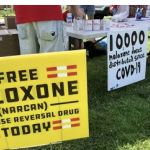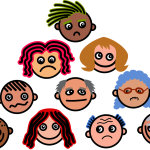If Tylenol trials are off the table, what else tempts? How about the weed killer Roundup - the most popular and successful herbicide ever? Luckily for the plaintiff’s bar, there’s some evidence that it causes cancer. There’s also sound evidence that it doesn’t. Eighteen cases have gone to verdict. Bayer (which owns Monsanto, the product’s developer) won ten; the plaintiffs won eight. So, is the stuff human-harmful or not? Who decides in a court of law and how? And what’s next?
Policy & Ethics
Prohibition of drugs simply doesn't work. Clamping down on Percocet and Vicodin resulted in a surge in heroin use. Fentanyl took care of that market and now even worse drugs called nitazenes are being found in fentanyl samples. Dr. Jeff Singer and I discuss this latest development in USA Today
Reflecting their baseless antagonism towards COVID vaccines, the state's legislature, governor, and attorney general have made decisions that will have deadly consequences for many Texans.
The Roman politician Cicero once said, “When there is no basis for an argument, abuse the plaintiff.” Some interpret this to mean that the best defense is a good offense. I’ve another interpretation: When you have no explanation – deflect, defer, confound, and confuse the listener with irrelevancies. That about sums up the latest rhetoric of climate change deniers.
In December, Federal Rule of Evidence 702, the federal statutory law governing expert witness opinion's admissibility, changed. This change was made to emphasize “[E]ach expert opinion must stay within the bounds of what can be concluded from a reliable application of the expert’s basis and methodology.” This will have profound implications for mass tort cases that rely heavily on scientific evidence and the testimony of expert witnesses.
Electric vehicles (EV) have been hailed as our gateway out of fossil fuel "addiction." But recent declines in EV sales driven by reliability issues have raised tough questions about the future of this once-celebrated technology. It's an age-old question: bidet or no bidet? Let's see if science can bring clarity to this contentious debate.
Critical Economic Theory is not a new concept. Like critical race theory (which is seen through a more controversial lens), CET seeks to examine and understand how systemic economics is ingrained in various aspects of society, including law, institutions, and social structures.
Here's the premise: social justice and equitable care increasingly require that those individuals providing your healthcare look like you and share your lived experience. To that end, medical schools have fashioned (or refashioned) their mission statements to explicitly call for diversity in their student bodies. But as a new study shows, words and intentions are not sufficient.
From 1839 to 1842, the British attacked China over the Chinese government's decision to ban opium. The French joined the fray between 1856 and 1860. The military superiority of the Western powers resulted in the legalization of opium in China. Karma – in the form of China's payback to the Western powers – is a bitch.
Methadone has been known to be an effective treatment for opioid addiction and dependency since the 1960s. Unfortunately, in this country, since 1972, the federal government segregates people with opioid use disorder from people with other health conditions that doctors treat in their offices by requiring them to travel miles each day to take a daily dose of methadone at government-approved clinics. Congress may soon undertake the first serious reform in how people get methadone in more than a half-century.
The Uniform Law Commission is an aggregation of 350 state-appointed commissioners who provide “states with non-partisan, well-conceived and well-drafted legislation that brings clarity and stability to critical areas of state statutory law.” In 1980, it drafted the medico-legal criteria for death, which were adopted by most states. In July, the Commission failed to reach a consensus on how to update a 43-year-old legal standard.
The classic ethical dilemma for autonomous driving is the "trolley problem." It's a binary choice of intentionally killing one person to avoid the deaths of multiple individuals – or yourself – while driving. But should this dramatic “edge case” be the model for autonomous vehicles’ decision-making? A group of researchers argue that more mundane driving scenarios would be better.











